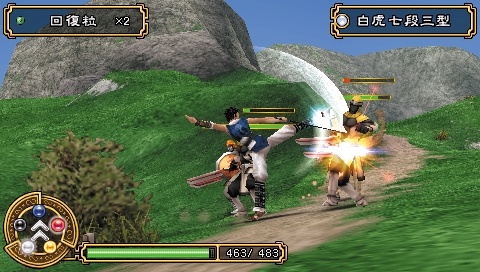Kingdom Of Paradise Reviews
Kingdom of Paradise takes advantage of some of the PSP's Wi-Fi features, with a simple battle arena, and the ability to trade kenpu and items with a friend. Players are also able to use their wireless internet connection to connect to the official site in the game to download additional features and equipment. Kingdom of Paradise - Sony PSP. With a multitude of great reviews i purchased it. But when I got it I started it and I was like, 'did I just get suckered in to another pathetic rpg?' Glad I was wrong. Story: Story is the one thing for me that can save even the worst gameplay. The game does start very slow but by about 2 or 3 hours things.
Battle for wesnoth forums. The Battle for Wesnoth Forums. The official forums for The Battle for Wesnoth. Skip to content.
Saving Paradise is the theme book for. It is provocative, thought-provoking, but ultimately flawed. Brock and Parker argue that the early Christian emphasis was not on crucifixion but on paradise, and paradise in the here-and-now. They subtitle the book: How Christianity Traded love of this world for crucifixion and Empire. I think that there is an important truth in this, that we need to hear, but unfortunately I think that the authors weaken their argument by over-stating their case and relying on problematic evidence.Saving Paradise (2009) argues that early Christianity focused not on the crucifixion of Jesus but on the power of the risen Jesus bringing paradise to the here and now.
The book is about “seeking to understand the history of Christianity’s forgotten love for this world” (p415) They argue that eternal life starts now and that paradise was on earth as well as finally fulfilled in the new earth. In short Brock and Parker argue (p88):Salvation in paradise was an experience and a place, as well as work yet to be completed.I think that this is an important insight which needs to be heard by Western (evangelical?) Christians: we need to regain our focus on experience, on the importance of Creation, on the good things and the joy that this world can bring.Brock and Parker note the importance of paradise to early theologians, with commentaries on Genesis 1-3 common. They also examine the iconography of Christian worship, which they argue did not include crucifixion scenes but sought to incorporate the worshippers into paradise.
Churches included scenes of pastoral harmony, Christ the Good Shepherd, and welcomed worshippers as part of the sacred cosmos. Flowing on from this they argue that this understanding motivated the practical social concern that was one of the characteristics of early Christians. As they say (p99):paradise was a reality that infused the church through works of love and rituals of sensual joy.Brock and Parker then trace what they argue is the history of the suppression of this idea.
So, for example, they contrast the actions of Ambrose calling the Emperor Theodosius to repentance (in AD 390) with the actions of Eusebius who welcomed Constantine (c.AD 324), based, they argue, on an emphasis as Christ as Victor who through war and violence brought victory. They also argue that the highly influential theologian Augustine also rejected the link between paradise and this world. Augustine’s book The City of God clearly distinguished between Rome and the city of God only embodied on Earth by the Church.As part of this Brock and Parker argue that the rejection of was in part about asserting the churches authority over the Emperor. However, it is worth noting that, for example, Ambrose was heavily involved in arguing against Arianism, and sought to prevent the Emperor from taking over churches for the use of Arian worship.Where I agree with Parker and Brock is in their argument that we have much to learn from early Christianity. So, for example, they contrast the individualistic understanding of Western society with the early Church’s understanding of humanity as socially enmeshed. They argue that individualism is inadequate to deal with the complex social realities of life and fails to deal with the complex problems confronting us.
As they say (p130):Paradise is not a private realm of personal spirituality – only communal practices and shared endeavors in ritually organized communities can open its gates.They also have a thought-provoking take on worship. As I’ve mentioned above, they argue that there is a greater range of earthy, paradisal themes in worship iconography. They also argue that the earliest Eucharistic prayers such as that in the Didache and that discussed by Clement do not reference the crucifixion. Even in later prayers the crucifixion is listed as one of the important events but not the focus for worship or theology. I appreciate your thoughts here. However, your point about the cross shaped sanctuary in Turkey is not a valid critique. The authors never say that crosses were not a part of the art and aesthetic of the early church.
In fact, the cross is readily evident even on the cover of the book in the mosaic from St Appolinare Church in Ravenna. Their point has to do with the representation of suffering in the person of Jesus on the cross, not with the empty cross itself and its many possible interpretations it offers to those who view it.Like. Hi Rick,thanks very much for your comment.
I think that my critique still stands (although I will have another look at the book to check).They argue that the focus (shown by the lack of images of the crucifixion) was on the incarnation and everlasting life of Christ. However, they don’t consider what it might mean to focus on the everlasting life of Christ (and his worshippers) in a building which was itself an image of the cross.As you imply, I think it’s a matter of emphasis, rather than absolutes, but I think that they overstated the case; and this example was a way of demonstrating it!I hope that makes it a bit clearer?Thanks again,from GrahamLike.
